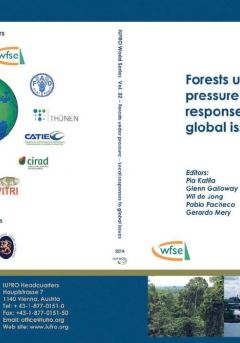Resource information
The new book Forests under Pressure: Local Responses to Global Issues is the third major publication produced by the Special Project World Forests, Society and Environment (WFSE) of the International Union of Forest Research Organization (IUFRO). The book was launched at the WFSE Technical Session during the IUFRO World Congress, October 2014 in Salt Lake City, Utah, USA, and is the result of the collaborative work of over 140 scientists and experts, as well as over 60 reviewers.
Building on 27 case studies from different parts of the world the book focuses on conditions that foster or hinder progress towards sustainable forest management (SFM) and forest-related development. The case studies use a common analytical framework of prerequisite conditions to examine the implementation of SFM. The analysis allows distinguishing prerequisite conditions and combinations of conditions that foster or constrain progress towards SFM and sustainable local development, and the interactions among these conditions. Researchers at RECOFTC – The Center for People and Forests contributed to the development of the book by writing three chapters presenting case studies from three of RECOFTC’s focal countries: Cambodia (chapter 11), Nepal (chapter 16) and Thailand (chapter 17).
Chapter 11: “Land grabbing and forest conflict in Cambodia: Implications for community and sustainable forest
Abstract: As a global phenomenon, land grabbing has significant economic, environmental, and social impacts, often resulting in serious conflict between the local community and outsiders. The aim of the study is to get a deeper understanding of the extent to which land grabbing and resulting land-use conflicts affect the move towards sustainable forest management (SFM) in Cambodia. Two case studies were conducted involving community forests (CFs), with data collected through literature review, key informant interviews, focus group discussions, and field observations. The results indicate that land grabbing in Cambodia, particularly through economic land concessions (ELCs), is often associated with conflict and thus has serious implications for sustainable land management, including SFM. Ambiguous property rights and overlapping claims, lack of coordination among government agencies, and lack of consultation and impact assessment prior to the decision-making process are the underlying causes of conflict. The study suggests that the Cambodian government should revisit the policy on ELC to ensure the policy goes hand in hand with sustainable land management objectives, including SFM. Additionally, the study underlines the importance of consultation and environmental and social impact assessment before the granting of an ELC license and the provision of capacity-development activities for conflict management. Finally, further research is needed to carefully evaluate ELCs and their role in SFM in order to gain deeper understanding of the impacts and to evaluate the strengths and weaknesses of ELCs within the context of the goal of SFM.
Chapter 16: “Enabling forest users in Nepal to exercise their rights: Rethinking regulatory barriers to communities and smallholders earning their living from timber”
Abstract: Community forestry (CF) is seen as an important tool for facilitating sustainable forest management; however, barriers often greatly inhibit CF’s ability to deliver on its full potential. The aim of this chapter is to examine one of the barriers to CF in Nepal. The barrier consists of regulations that greatly restrict a community’s ability to make a living from timber in its forests. An analysis of existing policies was conducted to identify the regulatory requirements placed on communities. An expert workshop was held in Kathmandu, and fieldwork was conducted in two CF sites to examine the impact of the regulations on communities. The findings show that the regulations place a hefty burden not only on the communities but also on government officials tasked with enforcing them. Additionally, the regulations actually facilitate illegal behavior by both deterring legal logging and encouraging payment of bribes. The findings highlight the need for revising the regulatory framework to further enable communities to sustainably manage their forests.
Chapter 17: “Transformative mediation, a tool for maximising the positives out of forest conflict: A case study from Kanchanaburi, Thailand”
Abstract: Transforming conflict is a key component of sustainable forest management. Transformative conflict mediation is an approach to transforming conflict that aims not only to resolve the conflict but also to foster long-term relationships and cooperation. This study explores how application of mediation contributed to conflict transformation. A case study from the village of Teen Tok in Kanchanaburi Province, Thailand, looks at the links and impact of mediation on 1) policies, institutions and governance; 2) livelihoods capacities and cultural and socio-economic aspects; and 3) the natural resource base. This chapter is based on two research projects conducted in 2009 and 2012. The data was collected through interviews, focus group discussions, an expert workshop, and literature review. Results show that third-party mediation played a crucial role in transforming prolonged conflict between national park officials and local people as well as in reconciling conservation and livelihood objectives. The study also found that the commitment and trust of the parties, the participatory nature of the process, and changes in forest-related policy and legislation have been critical factors in the success of the mediation and in management of national parks. Revisiting and improving the laws related to management of protected areas are important to ensure local people’s participation and secure the rights of local communities living within and adjacent to national parks. To improve the capacity of mediators, this study also suggests investment in appropriate capacity-development activities.
All chapters of the book can be downloaded here.
The complete publication is available for download here.


